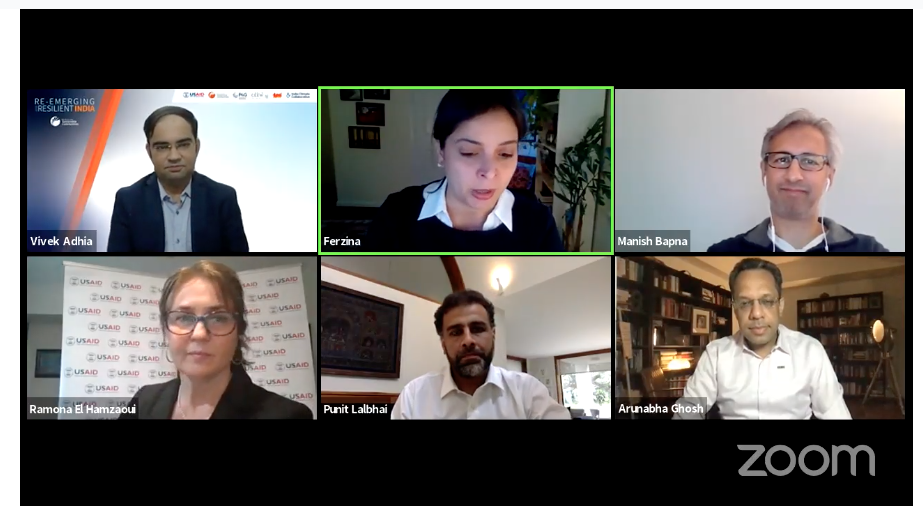ISC hosts Virtual Conclave on “Re-emerging and Resilient India”
Mumbai: The ongoing pandemic has evoked multiple discussions, which alluded to developing a rapid recovery plan for building long-term resilience. Recognizing the need to devise an action framework with a common vision for the “New World Order”, the Institute for Sustainable Communities (ISC), an international non-profit organization hosted a conclave on “Re-emerging and Resilient India” in partnership with USAID, CEEW, TERI, P4G, and India Climate Collaborative.
The aim of the virtual conclave was to bring representatives from the government, international organizations, think tanks, industry leaders, academicians, and practitioners together. The agenda was to discuss various perspectives, challenges, and highlight successful interventions on the ground that can be replicated at scale, to speed up the localization of several initiatives and implement them seamlessly.
The conclave was held in the august presence of Shri Suresh Prabhu, Member of Parliament, Government of India (GoI), who delivered a Special Address at the opening session.
Addressing the audience at the conclave, Shri Suresh Prabhu, Member of Parliament, GoI, said, “The pandemic has reinforced the links between health, environment and the economy. The ongoing crisis also demonstrated that governments and individuals can come together and initiate strong and rapid action in the face of an overwhelming challenge. The decisions taken today can provide immediate relief, and secure a lasting economic recovery, increase community resilience and ensure a long-term pathway to sustainable development.”
Setting the context at the conclave, Vivek P. Adhia, Country Director-India, Institute for Sustainable Communities said, “This is the opportunity for India to take action and achieve long term sustainable development. At this point, it is critical to have not just a green recovery, but also an inclusive one. As manufacturing expands in the country, boosting growth – practices that enable better access to clean water, clean air and secure livelihoods, can play an important role in building resilient communities and a resilient nation. We call for a calibrated approach that enables coordinated action focusing on the environment, while reaping social and economic benefits.”
Speaking of how sustainable recovery could be envisioned and realized for India, Dr. Arunabha Ghosh, Founder-CEO, CEEW, said, “The pandemic brutally exposed the fractures that existed in our system. We need to understand that success in managing such a crisis depends on a robust policy framework and the way it is implemented. The COVID-19 pandemic gives us an opportunity to shape the economic recovery in a manner that would deliver a new social contract between the state, the citizen and the enterprise, one that rests on two pillars: commitment to jobs, growth, and sustainability; and a razor-sharp focus on tail-end risks.”
Manish Bapna, Executive Vice President and Managing Director, World Resources Institute (WRI) spoke about the importance of acting now, and for India to proactively collaborate on the global recovery process, “The world is facing multiple crises, and it is critical that we see them as interconnected and address them together. The COVID-19 pandemic, the economic crisis, and climate change all hit the most vulnerable the hardest. Just as these crises have overlapping effects, we need to pursue solutions that simultaneously deliver short-term benefits while tackling the underlying drivers of social exclusion and environmental degradation. This is a once-in-a-generation moment to redesign our economies and societies to be more resilient, more sustainable and to leave no one behind.”
Re-emphasizing ISC’s commitment towards India and the approaches to resilient recovery, Deeohn Ferris, President, Institute for Sustainable Communities added, “ISC is supporting communities around the world to help them address environmental, social and economic challenges to build a better future, shaped and shared by all. In response to COVID-19, we are even more determined to enable communities, women, farmers, cities, and factories in Asia and the United States to not just bounce back, but to advance towards a more resilient and equitable society.”
Earlier this month, ISC in collaboration with Tarun Bharat Sangh (TBS) initiated a new dialogue series titled ‘Water and Livelihood Security: The Foundation to Make India Atmanirbhar’, where experts deliberated on the importance of water for overall human development is even more relevant and ways to improve water and livelihood security in India.
The power-packed virtual conclave hosted key thought leaders including Ramona El Hamzaoui, Acting Mission Director, USAID/India; Deepali Khanna, Managing Director, Asia Regional Office, The Rockefeller Foundation; Ajith Radhakrishnan, Country Lead, 2030 Water Resources Group; Aditi Maheshwari, Director, Climate Action, UN Secretary General Executive Office; Ian de Cruz – Global Director, P4G Partnering for Green Growth & Global Goals among others.

